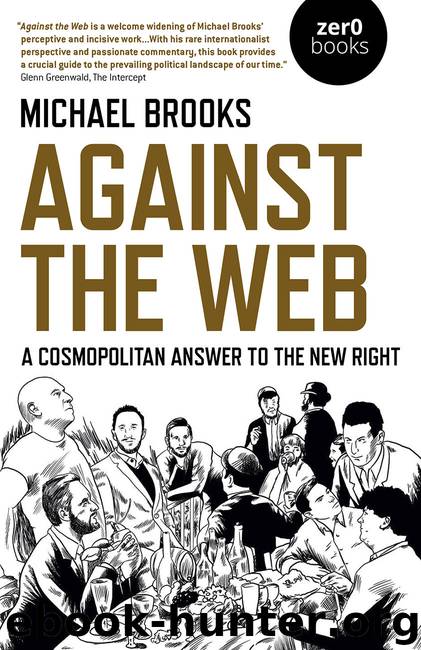Against the Web by Michael Brooks;

Author:Michael Brooks;
Language: eng
Format: epub
Publisher: John Hunt (NBN)
Published: 2020-02-25T00:00:00+00:00
Any reader who knows anything about any of these subjects should wonder what any of this has to do with either Marxism (“neo-” or otherwise) or postmodernism. Marxism doesn’t explain gender oppression or anything else in terms of bad people designing structures with the conscious intention of screwing over people who are unlike them. Instead, Marx and Engels offer an analysis of such structures that’s rooted in an economic and social analysis of the social relations that constitute and produce our material conditions. Postmodernism, meanwhile, is a school of thought that developed in rebellion against “grand narratives” about history and society—grand narratives like Marxism—and which argues there’s no such thing as a stable truth.
While many people have tried to point this out to Peterson in the last few years, he continues to violate both Rule 10 and Rule 9 (“Assume that the person you are listening to might know something you don’t.”) as he conflates Marxism and postmodernism in a wildly imprecise way. In the years since he wrote that passage, Peterson has become even more slippery in his analysis. He often drops the “/” and sometimes even the “neo-” in “postmodern/neo-Marxist.” He incoherently talks of “postmodern Marxism.” In a video entitled “The Fatal Flaw in American Leftist Politics,” Peterson goes so far as to claim that “French intellectuals” like Michel Foucault and Jacques Derrida, who had been Marxists and indeed “student revolutionaries in 1968,” pulled off a “sleight of hand and transformed Marxism into postmodern identity politics” in the late-1960s when revelations about how bad the Soviet Union was made it “impossible to be a thinking and conscious person and to be Marxist.”
This is embarrassing and historically illiterate. The most important revelations about the ugly realities of the Soviet Union came in Khrushchev’s speech to the 20th Party Congress in 1956, when the Soviet leader lambasted both Stalin and Stalinism. Khrushchev’s denunciations, combined with the Soviet invasion of Hungary later that year, led to mass defections from communist parties all around the world. No particularly new information about the Soviet Union or China came out in the late 1960s, though, and when what had happened in Hungary in 1956 repeated itself in Czechoslovakia in 1968—with Soviet tanks rolling into Prague to crush another experiment in building a more humane and democratic form of socialism—it led communist parties in Western Europe to distance themselves from the Soviet Union and drift toward what would become “Eurocommunism.” Meanwhile, a number of prominent Marxist intellectuals, including Jean-Paul Sartre, had long maintained their independence from the Communist Party. In fact, Sartre wrote a book in 1956 denouncing the Soviet invasion of Hungary, though this didn’t mean he stopped being a Marxist.
The idea that there were Marxist intellectuals and movements that consciously separated themselves from the Soviet Union, its brutalities, and its associated parties doesn’t seem to have occurred to Peterson as a possibility. This might be why he didn’t notice that the Communist Party of France (PCF) was actually opposed to the uprising of French workers and students in 1968.
Download
This site does not store any files on its server. We only index and link to content provided by other sites. Please contact the content providers to delete copyright contents if any and email us, we'll remove relevant links or contents immediately.
The Secret History by Donna Tartt(18062)
The Social Justice Warrior Handbook by Lisa De Pasquale(11932)
Thirteen Reasons Why by Jay Asher(8401)
This Is How You Lose Her by Junot Diaz(6403)
Weapons of Math Destruction by Cathy O'Neil(5784)
Zero to One by Peter Thiel(5450)
Beartown by Fredrik Backman(5295)
The Myth of the Strong Leader by Archie Brown(5206)
The Fire Next Time by James Baldwin(4993)
How Democracies Die by Steven Levitsky & Daniel Ziblatt(4935)
Promise Me, Dad by Joe Biden(4893)
Stone's Rules by Roger Stone(4822)
100 Deadly Skills by Clint Emerson(4650)
Rise and Kill First by Ronen Bergman(4530)
A Higher Loyalty: Truth, Lies, and Leadership by James Comey(4523)
The David Icke Guide to the Global Conspiracy (and how to end it) by David Icke(4351)
Secrecy World by Jake Bernstein(4346)
The Farm by Tom Rob Smith(4296)
The Doomsday Machine by Daniel Ellsberg(4224)
